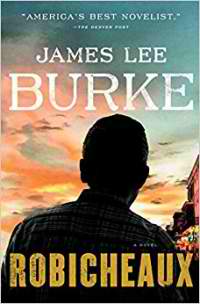
Published by Simon & Schuster on January 2, 2018
Dave Robicheaux falls off the wagon, has a blackout, and finds himself accused of murdering T.J. Dartez, the man who was responsible for his wife’s death. That’s a fairly standard thriller plot but James Lee Burke is not a standard thriller writer.
Dave’s involvement is investigated by an unlikeable colleague named Spade Labiche — unlikeable because he’s racist, sexist, and corrupt. While Dave is being investigated, he’s assigned to an investigation of his own. An acquaintance, Jimmy Nightingale, is accused of raping the wife of another acquaintance, Levon Broussard, after Dave introduced them. Nightingale is a politician who owns part of a reverse mortgage company that preys on the elderly and on Dave’s buddy Clete Purcel. He’s the kind of patrician elitist who tries to convince good old boys that he’s one of them, conning his way to election victories.
Broussard and Nightingale and Tony “Nine Ball” Nemo, who controls the southern branch of a criminal organization, are all involved in the production of a Civil War movie based on one of Broussard’s books. Broussard is a decent guy who has a blind spot about the Civil War. After Broussard shows Dave a Confederate flag carried by a 14-year-old boy at Shiloh, Dave thinks of his friend: “Yet here we stood in reverence of an iconic flag that retained the pink stain of a farm boy’s blood, and whether anybody would admit it or not, the cause it represented was the protection and furtherance of human bondage.” Dave’s daughter Alafair helps write the script, although she doesn’t have much use for Nightingale or Nemo or, for that matter, Labiche.
James Lee Burke’s discussion of the rape investigation presents a balanced view of the difficulty that fair-minded officers have when the truthfulness of a sexual assault allegation is less than clear. He also gives a harsh but unbiased account of corruption and unchecked drinking as a way of life in parts of Louisiana, while extolling the virtues of Cajun culture.
As always, Burke is a keen observer of life. He writes about what Americans do “when we lose faith in ourselves and reach out for the worst members of our species.” He unmasks hate-mongers who disguise their vile rhetoric as a protest against political correctness. All of that adds interest to the story without becoming a distraction.
Dave suspects that Nemo and a cruel character named Kevin Penney were somehow involved in the murders of eight prostitutes (the Jeff Davis Eight) that were the backdrop to The Glass Rainbow. A creepy but oddly principled killer named Chester (a/k/a Smiley) also wanders through the story, complicating Dave’s life with a string of murders.
Burke’s characters are always strong. Dave’s friend Clete plays a significant role as he tries to balance his innate goodness against his desire to destroy evil. Dave has similar problems, although his real battle is with his desire to drown his problems in alcohol, which is what caused the mess that starts the story.
The plot is intricate but credible. Burke doesn’t tidy up every loose end, but life is untidy. Robicheaux isn’t my favorite Burke novel, or even my favorite Robicheaux novel, but Burke is one of my three favorite crime writers and his books never disappoint.
RECOMMENDED